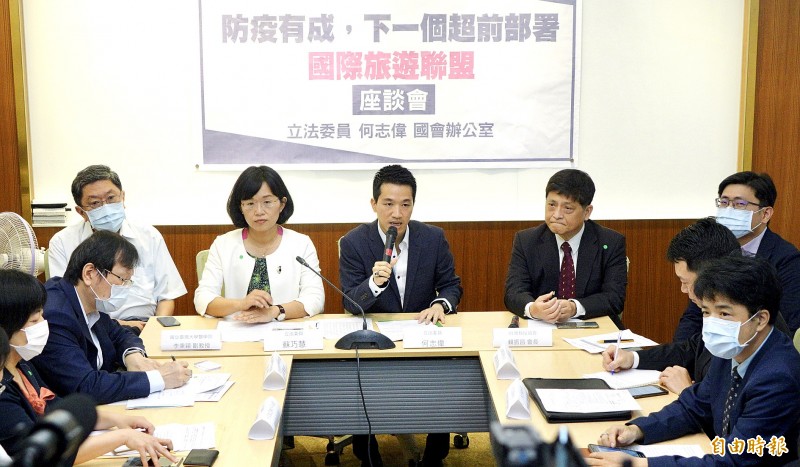《TAIPEI TIMES》National ranking when borders reopen

Democratic Progressive Party (DPP) Legislator Mark Ho, holding microphone, speaks at a seminar on post-pandemic travel and border openings at the Legislative Yuan in Taipei yesterday, as, back row from left, National Taiwan University pediatrician Lee Ping-ing, DPP Legislator Su Chiao-hui and Taiwan Solidarity Union Legislator Lai Cheng-chang look on. Photo: George Tsorng, Taipei Times
SAFETY RISK: The government is working to categorize countries based on their COVID-19 cases and prevention efforts, which would determine quarantine periods
By Shelley Shan / Staff reporter
The government plans to rank countries based on their COVID-19 risks to determine how to treat tourists and other travelers from those nations once Taiwan reopens its borders, but it is still working out the categories, a top health official told lawmakers yesterday.
“We would divide countries around the world into several categories. One category would comprise those countries with very few confirmed COVID-19 cases, such as New Zealand and Palau. Travelers from the countries in this category would only need to practice self-health management,” Centers for Disease Control Deputy Director-General Chuang Jen-hsiang (莊人祥) told a Legislative Yuan seminar hosted by Democratic Progressive Party lawmakers Mark Ho (何志偉) and Su Chiao-hui (蘇巧慧).
“Tourists from low-risk countries, such as Vietnam and Brunei, might be asked to undergo quarantine for five to six days after entering the country,” he said.
Taiwan has not had any confirmed domestic COVID-19 cases for 50 consecutive days, but there are now more than 6 million confirmed cases in the rest of the world, with the number rising in South America and Southeast Asia, Chuang said.
This means the government would face tremendous pressure when it decides to reopen Taiwan’s borders, he said.
“The most important thing is whether the countries whose tourists are allowed to enter Taiwan without having to follow quarantine requirements would allow Taiwanese tourists to do the same there. We need to work with the Ministry of Foreign Affairs to sort out the issues,” he said.
It is also crucial that people maintain the habit of wearing masks so that the nation can quickly and effectively contain a potential outbreak after the borders are reopened, he added.
Ho and Su have proposed that the government form an international travel alliance with other nations that have relatively few confirmed cases of COVID-19.
They cited Japan as an example, which is mulling lifting its disease-prevention restrictions imposed on business travelers as well as tourists from member states of the Comprehensive and Progressive Agreement for Trans-Pacific Partnership (CPTPP).
Taiwan could follow suit by first allowing tourists from countries where the pandemic has been effectively contained and disease-prevention information is transparent, the lawmakers said.
Department of East Asia and Pacific Affairs Deputy Director Su Ying-chun (蘇瑩君) said the foreign ministry has told Japan that Taiwan would like to be included in its initiative, and Tokyo is assessing the possibility.
Lee Ping-ing (李秉穎), a National Taiwan University Hospital pediatrician and consultant for the Central Epidemic Command Center, urged caution on border opening.
“The most challenging part would be how to define countries that are safe to travel to. How many domestic infection cases should the country have? Does it have the capacity to conduct screening tests? Can we trust its disease-prevention reports? How high would the risk of contracting COVID-19 be when traveling there?” Lee said.
It might be difficult to form a travel alliance with CPTPP members since they might have different disease-prevention standards, and accurate and updated information is only available if everyone agrees to share their data, Lee said.
新聞來源:TAIPEI TIMES















